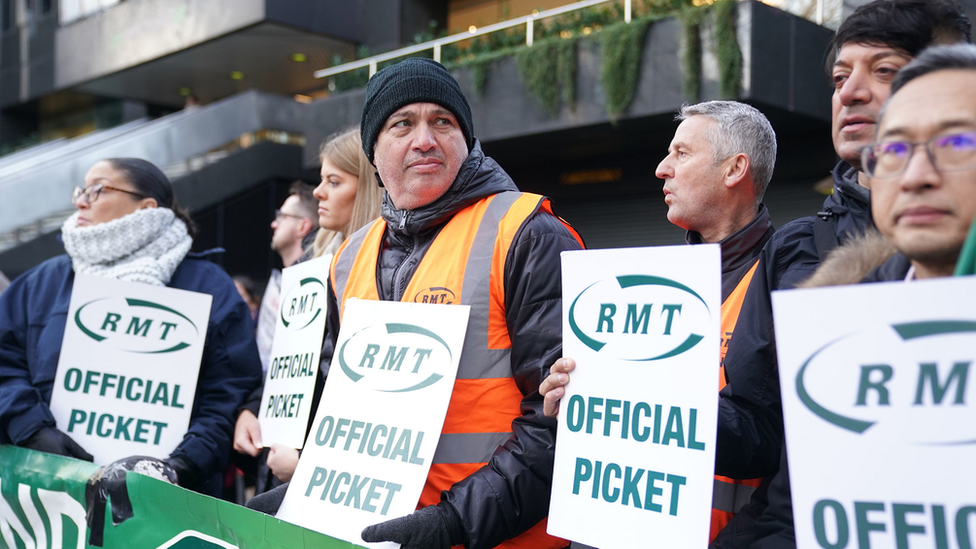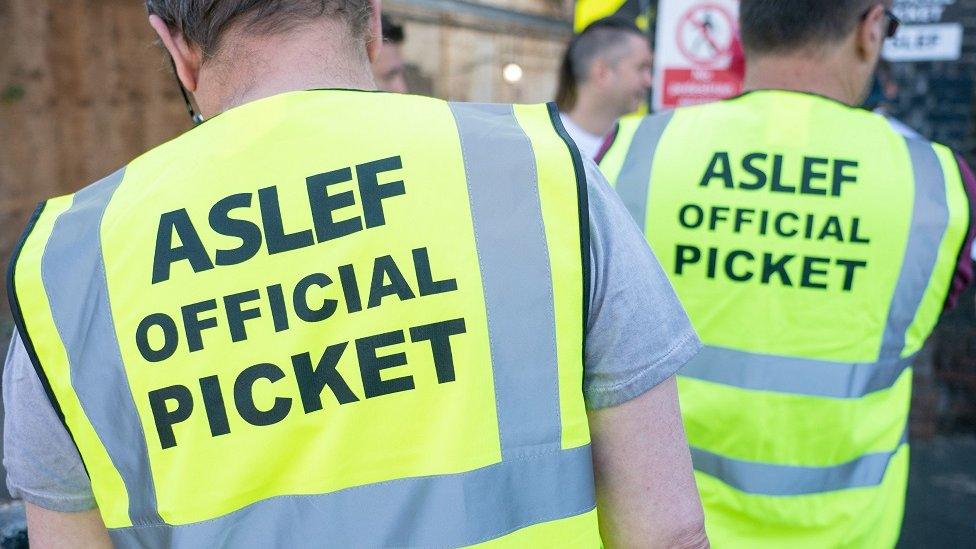Strikes bill: Unions criticise plans as unworkable
- Published
- comments
Business Secretary Grant Shapps: "We are duty-bound to protect the lives... of the British people"
Unions have criticised a new bill aimed at enforcing minimum service levels for the public sector during strikes as "undemocratic, unworkable and illegal".
Under the proposals, some public sector workers would be required to work during a strike.
The business secretary said the aim was to protect lives and livelihoods.
But unions have threatened legal action if the bill is passed, while Labour says they would repeal it if they win the next election.
The head of the Trades Union Congress, Paul Nowak, said that if it became law the legislation would "prolong disputes and poison industrial relations - leading to more frequent strikes".
"This legislation would mean that when workers democratically vote to strike, they can be forced to work and sacked if they don't comply," he said.
"That's undemocratic, unworkable, and almost certainly illegal."
The new bill, published on Tuesday, external, comes amid a wave of industrial action across the public sector as workers seek pay increases in the face of the rising cost of living.
Laws requiring a minimum level of service during strikes had already been promised for public transport as part of the Conservative's 2019 election manifesto. A bill was introduced to Parliament in October.
The government is now seeking to extend this requirement to five other areas - the NHS, education, fire and rescue, border security, and nuclear decommissioning.
To meet minimum staffing levels - which are still to be decided - employers would be able to issue a "work notice" to unions, setting out who is required to work during a strike.
Under the legislation there would be no automatic protection from unfair dismissal for an employee who is told to work under minimum service agreements but chooses to strike.
However, Business Secretary Grant Shapps pushed back on the idea workers would be sacked.
"No one is talking about sacking nurses... nothing we are announcing today in this bill from the despatch box is about getting rid of nurses any more than any employment contract has to be followed," he told MPs.

Mr Shapps said the government "absolutely believes in the right to strike" but it is "duty bound" to protect the lives and livelihoods of the public.
"We don't want to use this legislation but we must ensure the safety of the British public," he said.
Mr Shapps said the proposed legislation was similar to existing laws in other modern European economies and it was not designed to ban strikes.
He accused unions representing ambulance workers of "a lack of timely cooperation", which he said meant employers could not reach a national agreement for minimum safety levels during recent strikes.
He said this made "contingency planning almost impossible" and put lives at risk.
But unions disputed his claims as "completely false", with Unite's Sharon Graham saying agreements had been negotiated with regional managers to take into account local circumstances.
GMB said it was an "extraordinary attack" on ambulance workers, who had left picket lines to respond to urgent calls.
During December's strikes Category 1 calls - classed as the most life-threatening situations, such as cardiac arrest - were responded to by an ambulance. This will also be the case for Wednesday's strikes.
However, no blanket agreement has been reached on responding to Category 2 calls, which include strokes or major burns, with unions agreeing locally which calls within this category will be responded to.
Fire Brigades Union general secretary Matt Wrack called the bill a "shameful attack" on democratic rights and key workers.
Unite's Ms Graham described it as a "dangerous gimmick from a government that should be negotiating to resolve the current crisis they have caused".
Mick Lynch, head of the RMT transport union, said the "draconian legislation" sought to "punish workers" for demanding decent pay and working conditions.
Labour's deputy leader Angela Rayner said it was "utterly stupid" and "insulting" for Mr Shapps to go from thanking nurses to proposing to sack them for striking.
"How can he seriously think that sacking thousands of key workers won't just plunge our public services further into crisis?" she told the Commons.
"We all want minimum standards of safety, service and staffing. It is the ministers failing to provide it," she said, adding that the public was being put at risk every day by the crisis in the NHS and staff shortages.
Angela Rayner asks Grant Shapps about strikes in the public sector: "Any chance of a deal this year?"
MPs will get a chance to debate the bill - which applies to England, Wales and Scotland - next week.
After the bill makes it through the House of Commons, where the Conservatives have a sizeable majority, it is expected to face greater opposition in the House of Lords where the numbers are less favourable.
Any legislation would not have an impact on strikes this month, which are still set to go ahead.
Ambulance staff in England and Wales are preparing to walk out on Wednesday, while nurses in England are also set to strike next week.

Are you taking part in the strikes? Are you affected by industrial action? You can share your experience by emailing: haveyoursay@bbc.co.uk, external.
Please include a contact number if you are willing to speak to a BBC journalist. You can also get in touch in the following ways:
WhatsApp: +44 7756 165803, external
Tweet: @BBC_HaveYourSay, external
Or fill out the form below
Please read our terms & conditions and privacy policy
If you are reading this page and can't see the form you can email us at HaveYourSay@bbc.co.uk, external. Please include your name, age and location with any submission.
- Published5 January 2023
- Published9 January 2023
- Published5 January 2023
